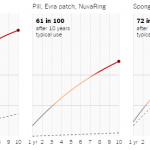Komen spent the last two days reaping a financial windfall from pro-life activists, after they pulled their funding for Planned Parenthood. (Planned Parenthood had a funding surge, too, prompting a friend of mine to say the whole thing felt like a publicity stunt, or a pro-wrestling storyline). Now, Komen has purged its new policy.
But before any pro-choice readers I’ve got decide to put the money where their mouths are, let me make a plea that you not give Komen any of your money. Not even as a thank you for the reversal. I agree with all the criticisms Simcha Fischer made back when Komen was on her side (they brand a lot of things, so people feel like they’ve made a difference by buying a pink Glock when only pennies of your purchase go towards research, they pressure women to be a happy face of cancer, etc).
But, since I’m a big epidemiology nerd, that’s not my real objection. I don’t like Komen because they’ve tried to subvert the FDA’s recommendations on mammograms. A panel of experts reviewed the data and said that, for women under 50 with no know risk factors for breast cancer, regular mammography does more harm than good. Komen and others struck back with personal testimonies from women in this demographic who had found cancer through screening.

The stories were touching, but the plural of anecdote is not data. It can be hard to wire the actual facts into your intuitions, so here’s a helpful story, to retrain your brain. The numbers in this example (from David Newman, a director of clinical research at Mount Sinai School of Medicine) are about prostate cancer screening, but the gist goes for breast cancer as well:
“Imagine you are one of 100 men in a room,” he says. “Seventeen of you will be diagnosed with prostate cancer, and three are destined to die from it. But nobody knows which ones.” Now imagine there is a man wearing a white coat on the other side of the door. In his hand are 17 pills, one of which will save the life of one of the men with prostate cancer. “You’d probably want to invite him into the room to deliver the pill, wouldn’t you?” Newman says.
Statistics for the effects of P.S.A. testing are often represented this way — only in terms of possible benefit. But Newman says that to completely convey the P.S.A. screening story, you have to extend the metaphor. After handing out the pills, the man in the white coat randomly shoots one of the 17 men dead. Then he shoots 10 more in the groin, leaving them impotent or incontinent.
Newman pauses. “Now would you open that door?” He argues that the only way to measure any screening test or treatment accurately is to examine overall mortality. That means researchers must look not just at the number of deaths from the disease but also at the number of deaths caused by treatment.
If you care about women’s health, don’t give to Komen. Give to Planned Parenthood, if you’re going for the political statement (I did). And no matter you’re beliefs on abortion, consider giving to Against Malaria Foundation (well reviewed by GiveWell) if you want to fund a great organization truly committed to health (and data!).












